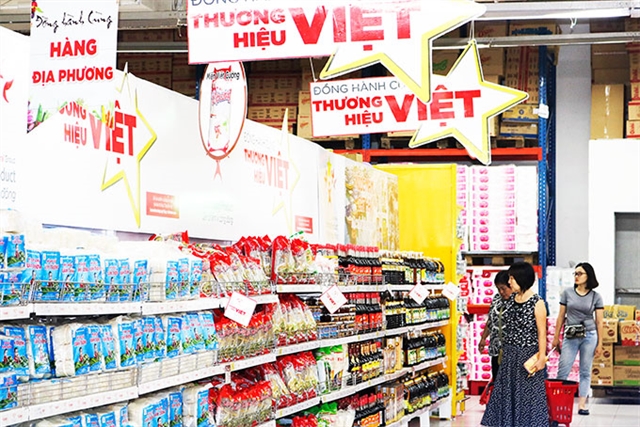 Economy
Economy


|
| A number of high-quality Vietnamese brands have a relatively large market share in the distribution system. Photo baokhanhhoa.vn |
HÀ NỘI In the context of increasing international integration, Vietnamese goods must ensure conditions of environmental protection, safety, high quality, low cost, great competitiveness, domestic market dominance and deep penetration of international markets.
The statement was made by Politburo member and permanent member of the Party Central Committee's Secretariat Trần Quốc Vượng at a conference held in Hà Nội on Friday.
The event was organised to review the 10-year implementation of the “Vietnamese people prioritise using made-in-Vietnam goods” campaign.
According to Vượng the campaign has achieved many outstanding results. A number of high-quality Vietnamese brands have a relatively large market share in the distribution system.
In particular, the business community has focused on improving technology, applying science and technology, renewing production processes, managing and increasing the localisation rate and scientific-technological content in products, creating quality products with nice designs and reasonable prices. Many products have become the pride of Vietnamese people, truly conquering domestic consumers and exporting to some countries around the world.
These results have contributed to completing economic targets, curbing inflation, stabilising the macro economy, reducing the trade deficit, moving towards trade surplus in recent years, ensuring the balance of supply and demand, especially for essential goods. In addition, there has been no price fever or lack of goods on Tết holiday or during peak season thanks to the campaign.
Vượng highly appreciated the Central Steering Committee for the campaign, as well as committees, authorities and organisations for actively implementing it, promoting patriotism, self-reliance, national self-esteem, as well as building the consumer culture of Vietnamese people. Through the campaign, a number of Vietnamese goods with high quality and competitiveness have been produced, meeting domestic and export consumption demands.
Businesses and producers have promoted responsibility towards consumers; focusing on the application of science and technology, renovating management, improving production, business and service capacity; attaching importance to product promotion, development of distribution system, gradually dominating the domestic market and better meet consumer demand.
However, the implementation of the campaign is still limited and faces a lot of difficulties. Competition for goods and services in the domestic market is on the rise, especially when it comes to multilateral and bilateral agreements signed by Việt Nam.
It is both an opportunity and a challenge, creating competition in production and trade. The strong development of science and technology has a significant impact on production and consumption of businesses and people. Consumers have more choices and higher requirements for Vietnamese goods in terms of standards and quality.
Dominating the retail market
In the context of increasing international integration, Vượng said that in the future, the campaign should continue to be implemented more strongly, creatively and practically.
Vượng also emphasised the core value of the campaign must be to dominate the market, ensure the output for Vietnamese goods, and promote domestic production.
In order to achieve this target, functional agencies want enterprises and producers overcome difficulties and concentrate on connecting supply and demand; promote links among manufacturers, distributors and consumers.
The State should support enterprises to build brands and protect intellectual property rights; while encouraging the domestic market to develop and increase opportunities for consumers to approach Vietnamese products, Vượng added.
Sharing the view, Deputy Prime Minister Trịnh Đình Dũng voiced his hope that Vietnamese businesses seek ways to improve the quality and competitiveness of their products and services, build their brands, and deliver on their commitments to ensuring consumers’ interests.
He suggested ministries, sectors and enterprises focus on domestic trade promotion, better the distribution network, and issue standards in accordance with international commitments to gradually control imported products and market order.
It is also important to strengthen market management and strictly handle the trading of counterfeit products, violations of intellectual property, and illegally-imported commodities, he added.
Statistics of the Ministry of Industry and Trade show that the proportion of made-in-Việt Nam products reaches at least 90 per cent of supermarkets and over 60 per cent at traditional markets and convenience stores.
Total goods retail and service revenue has grown by 10 per cent each year since 2009, while inflation has dropped from 19.8 per cent in 2008 to below five per cent in recent years. The economy has shifted from trade deficit to trade surplus. The country reported a trade deficit of US$12.5 billion in 2010, but it enjoyed a trade surplus of $7.2 billion last year.
The localisation rate has also increased significantly in several major industries, such as garment and textiles and footwear. VNS




